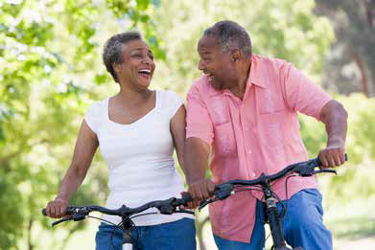
 During the summer months, staying hydrated is more important than ever, especially during heat waves. The reason for this is simple: Dehydration diminishes your ability to regulate temperature, and thus, your risk of developing a heat illness rises dramatically.
During the summer months, staying hydrated is more important than ever, especially during heat waves. The reason for this is simple: Dehydration diminishes your ability to regulate temperature, and thus, your risk of developing a heat illness rises dramatically.
Heat illnesses are of special concern to senior citizens, because older adults are much more affected by summer heat. For instance, from 1999-2009, roughly 40 percent of all heat-related deaths in the U.S. – nearly 3,000 – were adults over 65 years old.
Why are seniors more prone to heat illnesses?
When we age, our bodies become less efficient at regulating temperature for a couple of reasons. Seniors over 65 don’t sweat as much as younger adults, which unfortunately is one of the body’s most important heat-regulation mechanisms. Also, seniors store fat differently, which complicates heat-regulation in the body further.
Why’s this serious?
Well, as the temperature rises, so too does your internal body temperature, especially when you’re exposed directly to the sun or extremely hot environments. Which is why seniors suffer from heat stroke more often than younger people throughout the summer.
Why is preventing dehydration important?
Studies have shown that when you feel thirsty – just 2 percent dehydration – your ability to regulate heat begins to decline. For seniors, who already struggle to manage internal heat, dehydration can deter the body’s natural cooling processes even more. During heat waves, seniors should be drinking water and juices regularly, and a good rule of thumb is to drink fluids at every meal, as well as sipping fluids throughout the day rather than drinking them quickly. Also, avoiding alcohol can encourage better hydration.
If you are dehydrated, though, an electrolyte drink like Drip Drop may help you rehydrate more quickly and retain more fluids.
The Milwaukee County Department on Aging (MCDA) offers help seniors to beat the heat this summer.
Cooling sites
• MCDA is a member of the Milwaukee Heat Task Force. The Heat Task Force coordinates agencies throughout the community and develops strategies to protect citizens during times of extreme heat.
• The City of Milwaukee maintains a list of available cooling sites in the area. These include libraries, senior centers, and other community sites. http://city.milwaukee.gov/health/HotWeatherSafety#.WzYfY7gnaDt
Warning Signs of Heat Stroke
• Hot, dry skin (no sweating)
• Throbbing headache
• Dizziness
• Nausea
• Rapid pulse
• Body temperature above 103 degrees
Statistics from State of Wisconsin From 2011 to 2015 Wisconsin had 48 confirmed heat-related fatalities and over 70 percent of these were among seniors. https://www.dhs.wisconsin.gov/climate/heat.htm
Tips to Prevent Heat Stroke
• Rest
• Take a cool shower, bath or sponge bath
• Wear lightweight clothing
• Remain indoors
• Turn on your air conditioning or a fan
• Drink lots of water
• If necessary go to one of the designated cooling sites in our community
Check on your neighbors.
Please take time to check up on those folks who may be at risk during this extreme heat. Aging Resource Center (414) 289-6874 Older adults should know that there is an Aging Resource Center they can call for help and information about resources during hot weather. (After hours calls are directed to Impact 211 who can also assist.)










